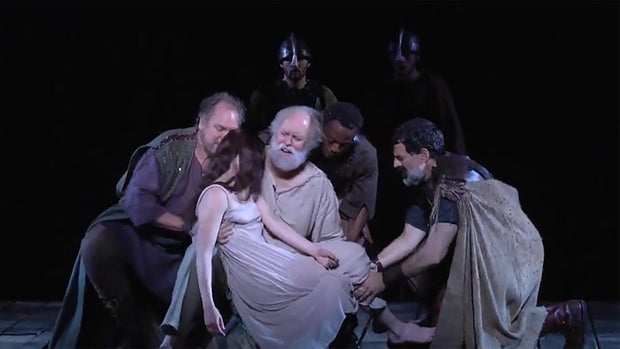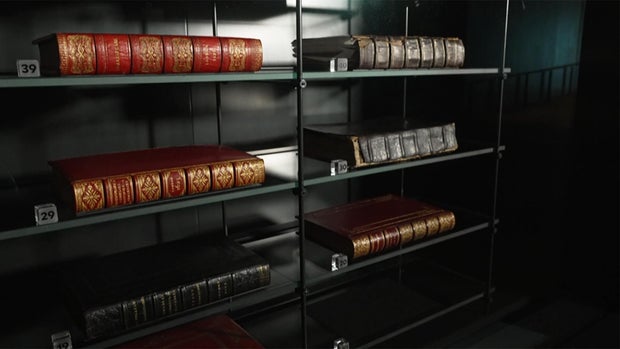
“O for a muse of fire”: The modern appeal of Shakespeare
8. June 2025
I know what you’re thinking: Shakespeare, ugh! Is this one of those take-your-medicine, eat-your-spinach, good-for-you stories I should watch but really don’t WANT to watch?
Well, fear not! Ira Glass, creator and host of the popular public radio program “This American Life,” has felt your pain since high school. “It was hard to read in school,” Glass said. “It seemed like, Oh, that’s what smart people like. I felt, there must be something here.”
And then, in 2014, Glass attended a production of “King Lear” in New York’s Central Park, starring John Lithgow.
Public Theater
After the play, Glass tweeted out: “Shakespeare: not good. No stakes, not relatable. I think I’m realizing: Shakespeare sucks.”
“I thought it was obvious that it was a joke, but people did not take it as a joke,” he said.
And the backlash was immediate: “Ira Glass is a philistine for saying Shakespeare sucks” (The New Republic); “The internet is freaking out about Ira Glass saying Shakespeare sucks” (The Atlantic); “Ira Glass hates Shakespeare” (Chicago Tribune).
Glass said, “But I think that’s the problem with Shakespeare. I think, like, if you dare to say anything bad about it, you feel like, Oh, I must be dumb.”
Revenge and murder and treachery
“If Shakespeare saw a lot of his productions, he would say he sucked,” said Farah Karim-Cooper. “I don’t think Shakespeare would ever have been able, in his own time, to put a four-hour ‘Hamlet’ on his stage.”
And that’s from someone who has devoted her career to Shakespeare. Karim-Cooper, director of the Folger Shakespeare Library in Washingto, D.C., says Shakespeare’s “Romeo and Juliet” spoke directly to her: “I think as a Pakistani-American teenager, I couldn’t believe that Shakespeare actually understood my family. Because my grandmother had an arranged marriage, and then my mother was told she has to marry someone that they choose. And she’s like, No, I’m marrying this man. And she married my dad who was a sea captain. So I was like, How does he know about Pakistani families?“
It seems that Shakespeare, born in 1564, also knew about teenage girls growing up in Washington, D.C. “When I was 13, my older brother took me to see my first Shakespeare, and I immediately decided Hamlet was my boyfriend, not realizing he may be the worst boyfriend in the world!” said Maureen Dowd, a Pulitzer Prize-winning columnist for The New York Times. “Then, I began studying Shakespeare in school and completely fell in love with his work.”
Two years ago, Dowd went back to school and received her master’s degree in English Literature from Columbia University, where she focused on Shakespeare. “What I love about Shakespeare is he deals in primary colors,” she said. “He is about revenge and murder and treachery – that’s actually exactly how I program my Netflix algorithm. So, to me, he’s very modern.”
“Lord, what fools these mortals be!”
Opened in 1932, the Folger Shakespeare Library was a gift to the nation from businessman Henry Folger and his wife, Emily. Recently renovated at a cost of $80 million, the library holds the world’s largest collection of what are known as first folios – the earliest printed compilations of 36 of Shakespeare’s plays. The folios, said librarian Greg Prickman, mark “a transition from Shakespeare on the stage to Shakespeare on the page.”
Today, the folios have been sold for as much as $10 million. Without them, his plays may very well have been lost.
CBS News
Dowd says it’s fitting that the Folger is located in the nation’s capital: “Outside in the garden, there’s a silvery statue of Puck from ‘Midsummers Night’s Dream,’ and the line, ‘Lord, what fools these mortals be,’ and it faces the Capitol. And there’s never been a more apt description of politics in Washington than that.”
In fact, Dowd says, Shakespeare was a cultural father figure to America’s earliest leaders. “The Founding Fathers were very steeped in Shakespeare,” she said. “Thomas Jefferson advised people to read Shakespeare from the time it got dark ’til the time they went to bed.”
John Adams read Shakespeare to better understand the dark side of power, and how to protect against it. “The Founding Fathers definitely used it to form the Republic,” she said.
Dowd herself cites the Bard in her new collection, “Notorious,” just as she has in her column ever since 1995, when Bill Clinton was president. “Clinton just is such a classic Shakespeare character because he just had this tragic flaw of recklessness,” Dowd said.
She compared Vice President Dick Cheney to Iago, preying on the insecurities of George W. Bush’s Othello … Barack Obama to Hamlet, for his hesitancy and indecisiveness … and as for Joe Biden? “If Joe Biden had read ‘King Lear,’ he would’ve realized the dangers of the gerontocracy, and you really should not cling to power and suffocate the younger people who are coming along,” Dowd said.
And then there’s the current commander-in-chief: “Donald Trump reminds me of several different plays. He’s kind of like late Lear, howling at the moon. He’s also like Julius Caesar in a republic, but trying to grab the crown and think of himself as an emperor,” Dowd said.
“Thou art a villain”
Actor Patrick Page was introduced to Shakespeare by his father, also an actor. In his first copy of Shakespeare, given to him when he was nine years old, Page’s father wrote the following inscription: “To Patrick – May you find much joy in these words. Love, Dad.”
“All the Devils Are Here”
Since 2017, Page has been performing his one-man show, “All the Devils Are Here: How Shakespeare Invented the Villain.” As he describes it, “Their tragedy is not that they are evil; their tragedy is that, hand in hand, they choose evil.”
Asked why Shakespeare’s villains are so enduring, Page replied, “I think because we’re all interested in the darkness in ourselves. Shakespeare gives these villains true motivations, true inner lives, true back stories.”
In his show, Page explores the villainy of characters who still speak to us today. For example, both Heath Ledger’s Joker in “The Dark Knight” and the Wicked Witch of the West in “The Wizard of Oz,” he says, are descended from Shakespeare’s deformed-with-evil Richard III, while Walter White, in “Breaking Bad,” is very much like Macbeth.
As terrifying as these characters are, Dowd says there’s nothing to be afraid of when it comes to Shakespeare. “With Shakespeare there are always more layers,” she said. “I mean, it’s a constant source of amazement, because Shakespeare was the best entertainer of all time, I would say.”
WEB EXCLUSIVE: Extended interview – Maureen Dowd on Shakespeare
For more info:
- “All the Devils Are Here: How Shakespeare Invented the Villain” by Patrick Page (patrickpageoinline.com)
- Folger Shakespeare Library, Washington D.C.
- Ira Glass on Instagram
- “This American Life”
- Maureen Dowd, The New York Times
- “Notorious: Portraits of Stars from Hollywood, Culture, Fashion, and Tech” by Maureen Dowd (HarperCollins), in Hardcover, eBook and Audio formats, available via Amazon, Barnes & Noble and Bookshop.org
- Open Source Shakespeare
- Shakespeare Birthplace Trust
- williamshakespeare.net
- Shakespeare’s Globe, London
Story produced by Jay Kernis. Editor: Lauren Barnello.
Brush up your Shakespeare:
FROM THE ARCHIVES: Rebuilding Shakespeare’s Globe Theatre (YouTube Video)
American actor Sam Wanamaker fought for years to recreate Shakespeare’s Globe Theatre, which had burned down in 1613. He didn’t live to see a new Globe rise on the south bank of the Thames. In this Aug. 3, 1997 “Sunday Morning” report, correspondent Tom Fenton talked with actress Zoe Wanamaker about her father’s obsession, along with master builder Peter McCurdy; Mark Rylance, the actor-manager of the Globe; and American actors Christian Camargo and Steven Skybell, about bringing the immortal works of Shakespeare to life in “The Wooden O.”
Also:


